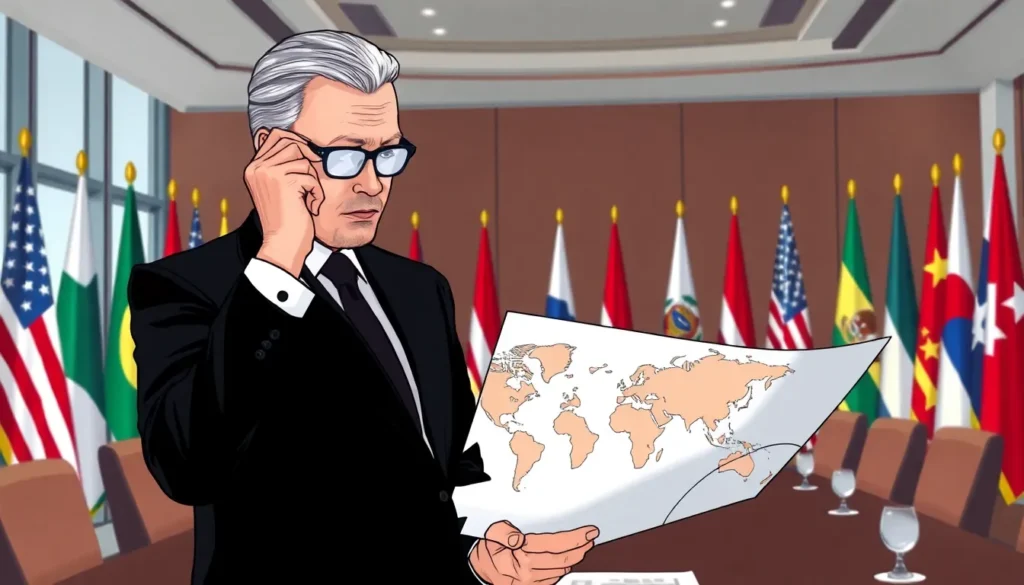In a world where headlines change faster than a cat can knock over a glass of water, a global affairs degree offers the perfect toolkit to navigate the chaos. It’s not just about understanding politics or economics; it’s about decoding the intricate dance of cultures and power dynamics. Imagine wielding knowledge like a superhero cape, ready to tackle global challenges while impressing your friends at dinner parties.
With a global affairs degree, graduates dive into a realm where they can influence policy, champion human rights, and even make sense of that baffling UN meeting you heard about last week. Whether it’s saving the world or just landing a sweet job, this degree opens doors to opportunities that are as exciting as they are impactful. So buckle up—it’s time to explore how this degree can turn aspirations into action and equip the next generation of global leaders.
Table of Contents
ToggleUnderstanding Global Affairs Degree
A global affairs degree focuses on the intricate relationships that define the international landscape. This educational path encompasses various disciplines, including political science, economics, sociology, and cultural studies.
Definition and Scope
A global affairs degree equips students with knowledge about diplomatic relations, international law, and global economies. It covers topics like environmental policies, security issues, and human rights. Graduates analyze global challenges such as climate change and socioeconomic disparities. Program structures often include practical experiences, simulations, and research projects. This diverse curriculum prepares individuals for careers in government agencies, non-profit organizations, and multinational corporations.
Importance in Today’s World
Understanding global affairs is crucial in an interconnected society. Issues like terrorism, pandemics, and climate change require informed leaders to navigate complexities. Graduates contribute to policy formulation, humanitarian efforts, and advocacy for social justice. Their skills in critical thinking, communication, and diplomacy enable them to address pressing challenges. A global affairs degree opens avenues for impactful careers in diplomacy, international business, and academia, reinforcing the significance of informed global citizenship.
Curriculum Overview


A global affairs degree encompasses a diverse curriculum that prepares students for various challenges in international relations. This curriculum typically includes a blend of core and elective courses designed to provide a comprehensive understanding of global dynamics.
Core Courses
Core courses focus on essential topics in global affairs. Students often explore political theory, where they analyze fundamental principles influencing international policies. International relations courses cover diplomacy, conflict resolution, and the dynamics of cooperation among nations. Economic analysis is crucial, helping students understand global trade and fiscal policies. Courses on human rights and social justice examine equity across different cultures and societies. Students also engage with international law, acquiring crucial frameworks that govern state interactions. Research methodologies are important, equipping students with skills needed for analyzing data and policy impacts.
Elective Courses
Elective courses offer additional depth, allowing students to tailor their education. Options often include specialized topics like cybersecurity and terrorism, focusing on contemporary security challenges. Environmental politics is another area, addressing climate change and global sustainability efforts. International development studies explore strategies for fostering economic growth in developing nations. Regional studies enable students to specialize in areas such as Middle Eastern or Asian affairs. Language courses complement these offerings, enhancing communication skills in a global context. These electives prepare graduates for varied roles in diplomacy, non-profits, and global business.
Career Opportunities
A global affairs degree opens diverse career pathways. Graduates often find their skills in high demand across multiple sectors.
Potential Job Roles
Graduates may pursue roles such as policy analyst, where they assess and impact public policy. International development specialist positions focus on advancing economic and social projects globally. Diplomatic roles involve representing national interests abroad and facilitating international relations. Non-profit management offers opportunities to work for organizations addressing humanitarian issues. Additionally, graduates might become human rights advocates, influencing policies and practices that promote equality.
Industries and Sectors
Several industries eagerly seek global affairs graduates. Government agencies employ these professionals to navigate international relations and security challenges. The non-profit sector values their insights for designing effective advocacy and humanitarian initiatives. Private corporations also benefit from market analysis and risk assessments performed by educated graduates. Furthermore, academic institutions hire them as researchers and educators, driving forward the understanding of global dynamics. Consulting firms often recruit these graduates to offer strategic advice based on their expertise in international trends.
Skills Acquired
A global affairs degree provides essential skills that enable graduates to tackle complex global issues. This degree cultivates various abilities critical for success in diverse roles.
Analytical Skills
Analytical skills develop through intense coursework and projects. Graduates learn to evaluate data, assess policies, and discern patterns in global trends. They analyze complex information to provide informed recommendations. Critical thinking enhances their ability to solve problems creatively. Research methodologies build foundations for thorough investigation and insight generation. Whether addressing international law or human rights challenges, analytical skills position graduates to make impactful contributions in their careers. These skills are crucial in determining the effectiveness of government initiatives and NGO programs.
Communication Skills
Communication skills are vital for professionals in the global affairs realm. Graduates excel in both written and verbal communications. They articulate complex ideas clearly for diverse audiences, including policymakers and the general public. Public speaking and presentations are integral components of their training. Negotiation tactics also feature prominently, preparing them to advocate effectively for various causes. Effective communication enhances collaboration in international teams and organizations. Mastery of multiple languages further enriches their ability to connect globally, making them invaluable assets in diplomatic and business settings.






